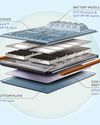
Ever since the Global NCAP began crash testing cars in 1997, it has hijacked the narrative on safety and their star ratings have become the de facto measure for consumers by which the safety of a car should be judged.
What has been completely ignored is the big leap in safety norms that were mandated in 2019 for all cars sold in India. The AIS-098 and AIS-099 standards which Indian cars have to meet, are broadly based on the latest UN international standards. They are pretty comprehensive tests which also include a side impact protection test that was missing all these years in the GNCAP tests.
It's only since 2022 that GNCAP has made side impact tests mandatory with a new and tougher protocol that also makes the fitment of electronic stability control (ESC) as standard in cars to get a five-star rating.
The current Global NCAP tests are centred around a frontal crash test into an offset deformable barrier (OBD) at 64 km/h which is significantly higher than the 56 km/h limit set by the AISO 098-099 test protocol which all Indian cars have to mandatorily meet.
As far as safety goes, scoring well in GNCAP's 64 km/h offset crash test as opposed to the less stringent 56 km/h test makes the GNCAP scores an important consideration that is increasingly becoming a purchasing decision for car buyers.
Indian manufacturers Tata and Mahindra have hitched some of their products onto the GNCAP bandwagon and engineered them to achieve the maximum five-star rating to take the moral high ground on safety. Recently VW and Skoda too secured five-star ratings for the Taigun and Kushaq respectively and have been publicising the results with a marketing blitz.
Diese Geschichte stammt aus der 1st January 2023-Ausgabe von Autocar Professional.
Starten Sie Ihre 7-tägige kostenlose Testversion von Magzter GOLD, um auf Tausende kuratierte Premium-Storys sowie über 8.000 Zeitschriften und Zeitungen zuzugreifen.
Bereits Abonnent ? Anmelden
Diese Geschichte stammt aus der 1st January 2023-Ausgabe von Autocar Professional.
Starten Sie Ihre 7-tägige kostenlose Testversion von Magzter GOLD, um auf Tausende kuratierte Premium-Storys sowie über 8.000 Zeitschriften und Zeitungen zuzugreifen.
Bereits Abonnent? Anmelden

Spain's Fersa Group invests in India-based Delux Bearings
Besides theRs100 croreinvestment, the Indian company gets access toadvanced technologies and bearings with arange of applications that willhelpinits global growth strategy, writes Manobhava Baruah.

Tata Autocomp to open compact dual-clutch transmission plant
Amidthe country’s growing need for personal mobility with easy manoeuvrability, comes the demand for vehicles with automatic transmission. Tata AutoCompisready tomovein writes Shruti Mishra.

Pankaj Munjal-backed Hero Motors raises equity from GEF Cap
The company willinvest Rs1,500 crore over thenextthree years andit expects 60 percent ofits turnover to come fromelectric vehicle parts. Itaims to becomea Global EV Solutions Company from India

New age thermoplastics for next-generation EV batteries
Saudi-based global materials major SABIChas developed cutting edgein fire-resistant polymers and flame-retardant materials that comply with various EV battery safety standards across the world.

Switch Mobility to meet growing e-bus demand with fresh capex
Oncourse for abillion-dollar business, the company is exploringa possibility of operating satellite factories across the country to serve different geographies, write ShahkarAbidi and Ketan Thakkar.

Kia India to invest Rs 2,000 crore in EVS, to introduce new e-RV in 2025
New investmentto drive R&D, infrastructure development and manufacturing capabilities. The company willlocally produce EVsin India with possibility of exports as well, writes Mayank Dhingra.

"The government has given enough time for indigenisation but the industry has not taken it seriously"
Amitabh Saran, Founder and CEO, Altigreen, shares his views on problems inthe EV industry and battery localisation solutions with Amit Vijay M.

TATA MOTORS SEES ONE INTWO CARS SOLDAS EVS BY 2030
The company aims to offer wider choices withnew EVs that may straddle a pricebracket of Rs20to 40lakhinthe coming years, writes Ketan Thakkar.

MG Motor India in expansion drive, to invest $100 million
The investment willbe usedtoramp up existing production capacity from1.2to1.4-15lakh units per annum atthe automaker's Halol plantin Gujarat, writes Ketan Thakkar.

"Technology and its multiplier effect are driving business transformations and customer experiences"
Technical Centre India is one of Continental’s largest research and development centres in the world, andasa Centre of Competence’ it also develops customised products for the BRIC countries.